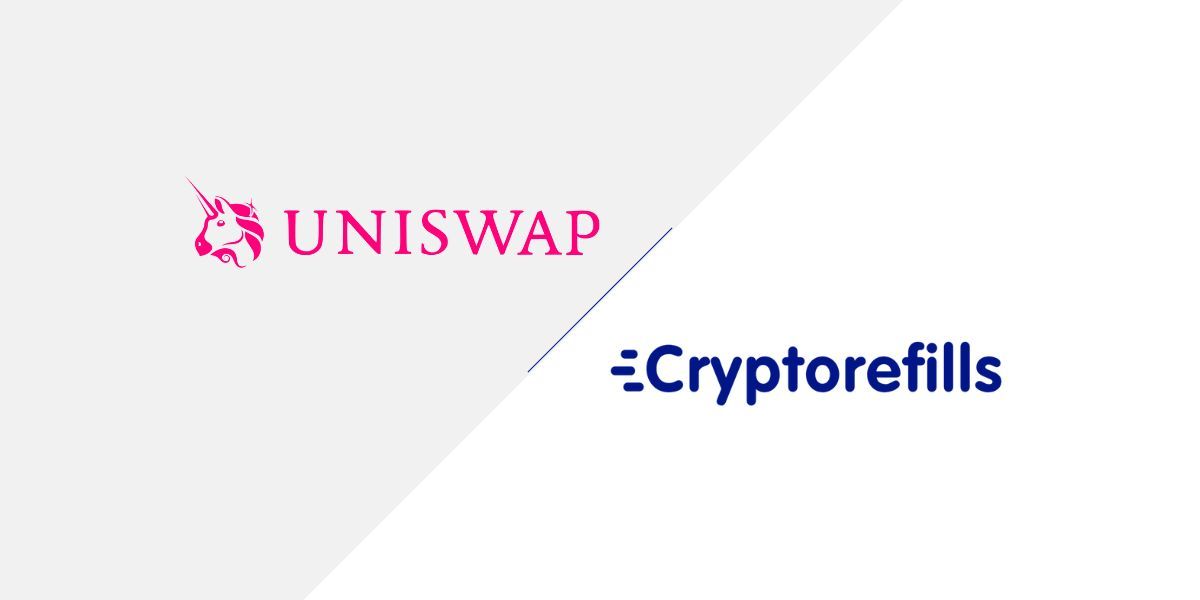Unleashing the potential of Uniswap and Cryptorefills

Massimiliano Silenzi
Enlightenments
5 Min read

As the world of decentralized finance (DeFi) continues to expand, the potential to create a seamless and flexible financial ecosystem is becoming increasingly apparent.
Uniswap, a decentralized exchange protocol on Ethereum, enables users to swap ERC20 tokens without the need for traditional intermediaries [1]. On the other hand, Cryptorefills is a platform that allows users to spend Bitcoin and other cryptocurrencies for everyday needs, aiming to boost crypto adoption across the globe. But how can these two distinct platforms work together to enhance user experience and increase the utility of cryptocurrencies?
What is Uniswap and how it works
Uniswap is a decentralized exchange (DEX) built on the Ethereum blockchain. It uses a protocol that allows users to trade ERC20 tokens directly from their wallets without the need for an order book or a centralized entity. Its unique feature is its use of liquidity pools and an automated market-making system, which is different from traditional decentralized exchanges that rely on order books [1, 2].
The core idea of Uniswap is to allow anyone to swap ERC20 tokens without needing buyers and sellers to create demand. In order to do this, Uniswap employs a pricing mechanism called the “Constant Product Market Maker Model”. Any token can be added to Uniswap by funding it with an equivalent value of ETH and the ERC20 token being traded. Then, instead of connecting buyers and sellers to determine the price of the token, Uniswap uses a constant equation (x * y = k) that uses the balance between the ETH and ERC20 tokens, and supply and demand, to determine the price of a particular token [2, 4].
Uniswap is fully decentralized and allows any ERC20 token to be listed without permission. Each token has its own smart contract and liquidity pool, and anyone can trade the token or contribute to the liquidity pool while earning a liquidity provider fee.
Uniswap v1 vs v2 vs v3
The exchange has undergone several iterations, each improving upon the last:
- Uniswap v1, launched in 2018, introduced the AMM model where liquidity providers deposit assets into pools to facilitate trades. It only supported ETH-ERC20 pair swapping and rewarded liquidity providers with LP tokens and trading fees [2].
- Uniswap v2, launched in May 2020, improved upon v1 by allowing ERC20-ERC20 token pools, thereby eliminating the “ETH bridging” problem and reducing costs and slippage. It also introduced flash swaps, allowing users to withdraw any amount of ERC20 tokens without upfront payment, and a protocol fee for platform development [3].
- Uniswap v3, launched in 2021, further enhanced capital efficiency and accuracy. It introduced concentrated liquidity, allowing liquidity providers to specify price ranges for their capital, and active liquidity, automatically removing liquidity from the pool when market prices exceed the specified range. Its fee structure is more flexible, with different rates for different types of pools and the ability to turn on a protocol fee via community governance [4].
Token swapping and everyday spending
Uniswap allows users to trade between any two ERC20 tokens on its platform, even allowing users to add their own tokens to the platform’s liquidity pool. Once a user has made a successful swap, they can hold the token, use it in other applications, or sell it. But what if they could also spend it directly?
This is where Cryptorefills comes into the picture. With the array of gift cards available for purchase on the platform, Uniswap users could use their newly acquired tokens to shop from a wide range of digital and retail brands, pay for services, or even top up mobile credit. This not only provides an avenue for users to spend their crypto but also helps drive wider adoption of cryptocurrencies in everyday transactions.
A seamless crypto ecosystem
Uniswap users can trade their tokens on the platform and then convert these tokens into gift cards via Cryptorefills. This opens up a whole new world of opportunities for spending crypto, making it as flexible and usable as traditional fiat currency. For example, a Uniswap user who swaps their tokens for a stablecoin like DAI or USDT could easily use CryptoRefills to purchase a gift card for a popular online retailer such as Amazon, Walmart, or Target. With over 4000 brands in its catalog, ETH, stablecoins and other tokens can be used on CryptoRefills to purchase gift cards for travel (Airbnb, Delta, Southwest, and others), for shopping (Nike, Adidas, Zalando) for games (Steam, Pubg, Eneba), VPNs and much more.
The combination of Uniswap and Cryptorefills forms a powerful combination in the DeFi world. It represents a step forward towards a more accessible and versatile cryptocurrency ecosystem where users have greater freedom in using their digital assets. As these platforms continue to evolve and expand their offerings, it will be exciting to see how the possibilities for crypto spending continue to grow.
If you are interested in spending your tokens for real-world goods and services such as Amazon, Airbnb, Netflix, and many other brands check out the Cryptorefills offering here.
References:
[1] Uniswap (n.d.). Uniswap Protocol. Retrieved May 23, 2023 at https://uniswap.org/
[2] Adams, H. (n.d.). Uniswap Whitepaper. Retrieved May 23, 2023 at https://hackmd.io/@HaydenAdams/HJ9jLsfTz
[3] Uniswap (2020, March). Uniswap v2 Overview. Retrieved May 23, 2023 at https://blog.uniswap.org/uniswap-v2
[4] Adams, H., Zinsmeister, N., Salem, M., Keefer, R., Robinson, D. (2021, March). Uniswap v3 Core. Retrieved May 23, 2023, at https://uniswap.org/whitepaper-v3.pdf